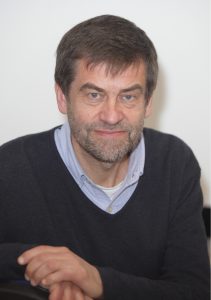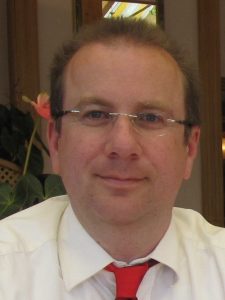 |
Alex Yakovlev |
| University of Newcastle |
| Joint ASYNC-FAC keynote presentation |
| Professor Alex Yakovlev is an international pioneer of low-power asynchronous circuit design and automation, for which he was elected to Fellow of IEEE in 2016 and RAEng in 2017. He is Professor of Computing Systems Design at the School of Engineering, Newcastle University, where he has been working since 1991, and leads a Microsystems research group. He received DSc from Newcastle University in 2006, and PhD from St. Petersburg Electrical Engineering Institute (Russia) in 1982, both in the field of asynchronous systems. Amongst his most notable achievements is the invention of the Signal Transition Graph, which is a de-facto standard for modelling asynchronous control circuits, its theoretical study, analysis and synthesis algorithms and CAD support (tools Petrify and Workcraft), extensively used by industry. In 2011, as a Dream Fellow of EPSRC, he proposed the idea of energy-modulated computing, which laid foundation to creating a bridge between asynchronous logic and analogue-mixed signal systems at a new level of understanding the interplay between energy flux and computations. |
| Title |
Async-Analog: Happy Cross-talking? |
| Abstract |
There are many interesting connections between digital and analog circuits and systems which go beyond traditional ADC/DAC. For example, research in the asynchronous community has been exploring purely analog effects such as metastability. Likewise, the effects of electromagnetic noise due to global clocking have been studied as well as cross-talk. In my group we have been recently investigating other new bridges between asynchronous and analog worlds. One of them is the design of what we call ‘little digital’ electronics which sits inside analog and mixed signal systems and controls the analog parts by switching energy flow in them. DC-DC converters and various kinds of sensors are examples where asynchronous circuits are increasingly more advantageous than their clocked counterparts. For example, they help not only reduce latency of response to events in analog parts, but also ultimately improve physical characteristics of the whole system such as power efficiency, smaller capacitors and inductors. This talk will cover these developments from the perspective of new models, design methodologies and CAD tools. |
 |
Dieter Härle |
| KAI |
| Dieter Haerle received his diploma in electrical engineering (Master degree) from the Karlsruhe Institute of Technology. His professional interests include analog and mixed-signal design and verification. He is a project manager in Kompetenzzentrum für Automobil- und Industrieelektronik GmbH (KAI), Austria where he is leading a project on materials, methods and applications for power devices and systems and coordinating the collaboration between KAI, Infineon Technologies AG and universities. |
| Title |
Trends and Challenges in Analog and Mixed-Signal-Verification |
| Abstract |
The verification of analog and mixed-signal circuits has advanced a lot over the past few years, but there are several challenges still unresolved. This presentation should give an insight into the current challenges faced by an mixed-signal designer/verification engineer and focus on some upcoming requirements and challenges in analog and mixed-signal verification. ISO26262, the increasing demand for quality and especially the proof of quality are steadily increasing the effort of chip verification. How can we cope with these increasing requirements? |


